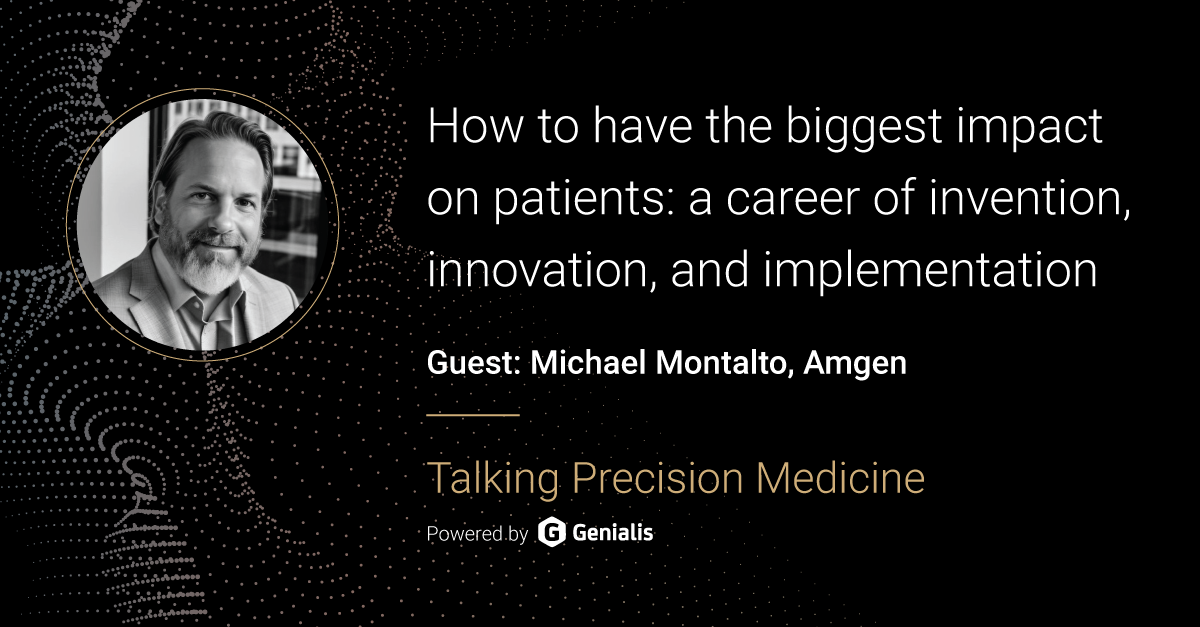Welcome to Talking Precision Medicine (TPM podcast) — the podcast in which we discuss the future of healthcare and health technology, and how advances in data and data science are fueling the next industrial revolution.
Today on the show, I’m joined by Michael Montalto, vice president of precision medicine at Amgen. Amgen is widely recognized as one of the most successful pharmaceutical companies in translating research and development into approved therapies. A key part of that success comes from their focus on precision medicine, and Mike brings a unique perspective from the forefront of that work.
Come on in and have a listen.
Episode highlights:
From inventor to VP: a multidisciplinary path
- Dr. Michael Montalto has spent 25 years driving innovation across diagnostics and pharma, from specializing in digital pathology to leading precision medicine efforts.
- He led innovation efforts at GE and PathAI, and returned to pharma with roles at BMS and now Amgen, where he leads Precision Medicine across different therapeutic areas.
How Amgen defines precision medicine
“Here’s a perfect world. You imagine a pie chart and, you know, maybe there’s 10 biomarkers. And if you get all 10 with the right therapy, you get a hundred percent of that patient population being treated.
The problem in the world that we live in today is, you can’t figure out what those 10 biomarkers and therapeutic strategies are all at once. You can only do one at a time. So if you do 10% and cure 10% of the patients, 90% of the patients have to wait for the next 10%. And that’s just not palatable, really. So you try to get as many as you can and then worry about resistance mechanisms.”
- Amgen takes a broad view: not just “right drug, right patient,” but also integrating translational science and real-world data to guide everything from early research to commercial launch.
- The team supports biomarker strategy across oncology, cardiometabolic, inflammation, rare disease, and obesity programs.
Why startup partnerships still matter
“Sometimes I feel like I’m a startup’s worst nightmare because I’ve done it. And so I can’t be fooled by the value proposition on a PowerPoint. I’ve really looked deeply for the value now, having been in a startup myself, and I make sure that it’s actually being shown. On the other hand, when we do tap into a company that really has value, I think it resonates really well with me.“
- While pharma is more capable than ever of building AI in-house, startups remain key drivers of innovation, especially in early-stage areas like spatial transcriptomics and epigenomic profiling.
- Pharma depends on venture-backed startups to de-risk technologies and deliver new capabilities at scale.
Scaling precision medicine means thinking beyond tumor biopsies
“I see all of this new technology coming to bear and what you would hypothesize – that multi-biomarkers are better than single biomarkers – is becoming a true statement. I can get, you know, highly predictive power out of EMR and large data sets. Everything that we thought would be true is becoming true.”
- Non-invasive, blood-based testing is on the rise. Amgen is exploring epigenetic signatures, ctDNA, and blood markers for diseases like NASH and cardiovascular conditions.
- Wearables may help decentralize trials and provide real-world endpoints, especially in settings like sleep apnea or metabolic disease.
“We’re looking for the most efficient, non-invasive way that’s going to be able to get the most information that would be clinically relevant. So, you know, again, you’ve got to translate these into a clinic somehow and scale them.”
What’s next in precision medicine?
“If you can capture that across millions of patients in real-world settings and use large language models to interrogate that and then come up with what our maintenance doses should be in real world, that can translate quickly into trials for us and, you know, potentially have almost like human experiments being done for us. And then we can go ahead and do clinical trials to validate what we think is already happening.”
- New modalities like multi-specifics, degrader technologies, and adaptive combination strategies are unlocking previously “undruggable” targets.
- Precision approaches are expanding rapidly into obesity, cardiovascular, and inflammatory disease; with the promise of tailoring treatments far beyond cancer.
This has been Talking Precision Medicine. Please subscribe and share our podcast with your colleagues, leave a comment or review, and stay tuned for the next episode. Until then you can explore our TPM podcast archive and listen to interesting guests from our past conversations.




